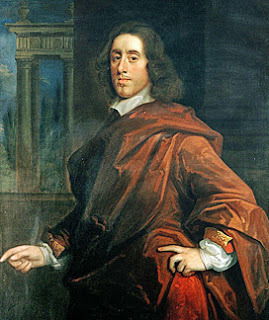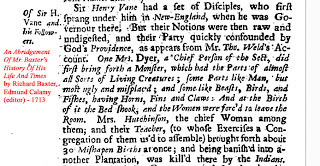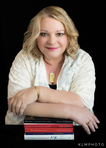Henry Vane the Whippersnapper
© Christy K. Robinson
Massachusetts Bay Colony Governors JohnWinthrop and Thomas Dudley were not close friends (in fact, they were rather miffedat one another on several occasions), but they were fathers-in-law,co-investors in the MassBay Company, and brothers in the faith. Despite theirdifferences of opinion in government matters (Winthrop was lenient on his erring friendRoger Williams and Dudley wanted Williams exiled even in harsh midwinter), it was theirpractice to stay professional, work together, and present a unified front.
 Henry Vane the Younger, 1637So imagine theirsurprise when cocky, 24-year-old Henry Vane called a meeting on January 18, 1636,about the "reconciliation" of Winthrop and Dudley. Among the citizens, factionswere forming for Winthrop and Dudley, said Vane. He was a new arrival to Boston in 1635, and camewith family wealth and royal court connections. He was popular with the peopleof Boston andthe magistrates hoped for Vane's brilliant career in colonial government.
Henry Vane the Younger, 1637So imagine theirsurprise when cocky, 24-year-old Henry Vane called a meeting on January 18, 1636,about the "reconciliation" of Winthrop and Dudley. Among the citizens, factionswere forming for Winthrop and Dudley, said Vane. He was a new arrival to Boston in 1635, and camewith family wealth and royal court connections. He was popular with the peopleof Boston andthe magistrates hoped for Vane's brilliant career in colonial government.
Those present at the meeting were Governor John Haynes,Reverends John Cotton, John Wilson, Thomas Hooker, and Hugh Peter, as well asWinthrop and Dudley, of course.
"Vane declared the occasion of this meeting," wrote Winthropin his Journal: "A more firm and friendly uniting of minds, etc.,especially of the said Mr. Dudley and Mr. Winthrop, as those upon whom theweight of the affairs did lie, and therefore desired all present to take up aresolution to deal freely and openly with the parties, and they each withother, that nothing might be left in their breasts, which might break out toany jar or difference hereafter."
After hearing Vane's concern about the lack of hugs,affectionate glances, Saturday barbecues, and warm fuzzies, Winthrop and Dudley protested (politelyand wordily) that they'd reconciled and healed their differences long ago, andthat they were "brothers," and if people complained, that was their problem. Surelythese fiftyish men with dignitas wereannoyed at being called out to a "come to Jesus meeting" by a meddlingtwenty-something newcomer. And seriously, wasn't there some real business to conduct?
Governor Haynes requested that the ministers confer andcreate a rule, and that they all should meet the next day. The conclusions of the ministers were that there should be "more strictness used in civil government and military discipline;" that the magistrates should confer privately, decide cases and deliver their verdicts with a face of unanimity; not to discuss cases out of court; speak not to the person but to the cause of a case; not to make faces or continue to argue against fellow magistrates when disagreeing; and that the magistrates should appear "more solemnly in public, with attendance, apparel [a dig at the dandily-dressed Henry Vane], and open notice of their entrance into the court." And further, that the magistrates should be more open and familiar with each other, visit more frequently, and honor the others.(As for the Massachusetts Baygovernors' council and their resolution for charity and professionalcomportment at the conclusion of Henry Vane's warm-fuzzy meeting, in the autumnof 1637, when these magistrates and ministers were trying Anne Hutchinson forheresy, they made personal attacks on her, and showed open contempt and disdain.Their emotions ran so high that they seemed to forget the rules of conduct laidout and agreed to in 1635. When Hutchinsondesired to know how she deserved the banishment sentence, John Winthropsnapped, "Say no more! The court knows whereof and is satisfied.")
It's quite possible that Henry Vane was already well-acquainted withWilliam Dyer and his former master,Walter Blackborne, both of whom had lived near the Thames in Westminster and were taxed in the sameparish (St. Martin-in-the-Fields) as Henry's father had been. Vane and Dyer, who were about four yearsapart in age, were admitted to freeman status (voters and members of the churchand community) at the same time.
When Henry Vane first arrived in Boston,he was admired for his Puritan fervor, his government connections in England,and his family's money (rich people were obviouslyblessed by God). His father, Henry Vane the Elder, who was an Anglican, hadgiven his eldest son and heir leave to spend three years in New England, and itseemed Henry was actually headed to Connecticut, but Boston caught him andthere he stayed. John Winthrop was peeved at Henry's flamboyance with hisapparel and his attendants (what you might call a posse).
Soon, Henry became a supporter of Anne Hutchinson and herteachings, along with the Dyers and many other men and women of Boston, and that really infuriated Winthrop. Henry, a single man, lived in the very nice home of Rev. John Cotton, one of the "stars" in the Boston firmament, and many of the Hutchinson teaching sessions revolved around the sermons of her mentor of 20 years, Rev. Cotton. Henry was in the very heart of the biggest thing to come down the turnpike—except that the Massachusetts Turnpike wouldn't be built for 320 years!
In May 1636, the young Henry Vane was elected governor of Massachusetts Bay and directed a military action againstthe Pequot natives; within seven months, he attempted resignation in tears, butwas urged to complete his year's term. In March 1637, he and scores of othermen signed a Remonstrance against the governors' council in their heavy handling ofthe Wheelwright controversy, and that was called sedition by that council (thecouncil retaliated in November of that year). In May 1637, he was replaced as governor byJohn Winthrop's reelection.
Henry Vane may have beenplanning to lead a group of investors and important members of Boston,to a new "plantation" in Rhode Island.Members of the Wheelwright faction, who had signed the Remonstrance, weredissatisfied with the politics and governance of John Winthrop and the deputygovernors and ministers, and were planning a move as early as the summer of 1637, before AnneHutchinson's first trial for heresy, and her exile from Massachusetts. Losing these men's businessskills and financial assets would be an economic setback to Boston, and they'd be too far away for themagistrates and ministers to control. The renegades were talking with Roger Williams andthe Narragansett Indians about purchasing Aquidneck Island—whichthey did in the early winter of 1638 when it was obvious that Anne Hutchinson and her adherents were being banished, and they were forced to accelerate their plans.
But Henry abruptly sailed back to England in August 1637, a yearearly. The same month, the Bay's ministers held a convocation to affirm their belief in salvation (only for the Elect or predestined) confirmed by keeping the Sinai Laws, and decry the Hutchinson teaching of salvation by faith in the grace of God, apart from the law. At the meeting, they set a November date for Anne Hutchinson's heresy trial.
[image error] An official letter signed
by Henry Vane in 1643
(second, centered). Henry Vane took up naval administration with favorable professional advancementcourtesy of his powerful father. By 1640, he was knighted, married to the daughter ofParliament's treasurer, and started a large brood of children. As a Puritan, hesupported the Parliamentary cause in the English Civil War of the 1640s, and was appointed Treasurer of the Navy. He continued to have an important, respected role in Great Britain's relations with its American colonies.
When Mary Dyer gave birth to her seventh child in 1648, the baby was named Henry—almost certainly in honor of Sir Henry Vane. (Her eighth child, born in 1650, was named after King Charles I, who had been executed the year before.)
During the 1650s, Vane was at times the head of the Englishgovernment, when the council presidency rotated around to him. In 1652, hecommissioned William Dyer as Admiralin the Anglo-Dutch war. Vane retired to Raby Castle in County Durham(which his father had bought from the Crown in 1626), with his wife and large family,and wrote several books that would be criticized for their liberality ofthought, especially as regarded liberty of conscience. Sir Henry Vane the Younger in about 1652.
Sir Henry Vane the Younger in about 1652.
When Mary Dyer spent nearly five years in England, from 1652 to 1657, it may be that she enjoyed the hospitality and protection of Henry and Frances Vane at times, even as many Quakers were being beaten and imprisoned around the country. Imagine the spirited discussions they would have held regarding liberty of conscience, grace and works, and the inspiration of what many at the time called "Inner Light." A historian wrote that Henry "presented himself as a 'witness' oflight." (Perhaps that was Mary's influence!) In fact, Quaker founder George Fox met with the Vanes at Raby Castle in 1657 (after Mary had departed for America in January). When Fox and Vane could not agree on theology, Fox remarked later that Vane was "vaine & high & proude & conceited."
Henry fell out with Oliver Cromwell, the Lord Protectorof the realm, and was arrested andimprisoned regarding his publications. He was released to home, and arrested again, spending some"quality time" in a castle prison where the high-status political prisonerswere held. In 1662, he was politically betrayed and beheaded for treason onJune 14. He'd done no wrong, but the new king, Charles II, was told that Vane was too dangerous to keep alive. (Similar to modern corporations which sweep out the long-term administrators and employees for new bosses to bring in a new "team.")
Samuel Pepys attended Henry Vane's execution and recordedthese lines in his journal:
 You may have read in genealogy or wiki pages on the internet that Henry Vane the Younger was the father of Mary Dyer's "monster" anencephalic baby, and/or of Anne Hutchinson's molar pregnancy. That rumor started decades after the tragic pregnancies, some years after Vane's execution to cast judgment and vitriol on three people who were considered religious heretics. There is NO foundation to that lie.
You may have read in genealogy or wiki pages on the internet that Henry Vane the Younger was the father of Mary Dyer's "monster" anencephalic baby, and/or of Anne Hutchinson's molar pregnancy. That rumor started decades after the tragic pregnancies, some years after Vane's execution to cast judgment and vitriol on three people who were considered religious heretics. There is NO foundation to that lie.
For more information about Henry Vane the Younger, who is the ancestor of Raby Castle's current owner, Henry Vane Lord Barnard, click HERE.
Massachusetts Bay Colony Governors JohnWinthrop and Thomas Dudley were not close friends (in fact, they were rather miffedat one another on several occasions), but they were fathers-in-law,co-investors in the MassBay Company, and brothers in the faith. Despite theirdifferences of opinion in government matters (Winthrop was lenient on his erring friendRoger Williams and Dudley wanted Williams exiled even in harsh midwinter), it was theirpractice to stay professional, work together, and present a unified front.
 Henry Vane the Younger, 1637So imagine theirsurprise when cocky, 24-year-old Henry Vane called a meeting on January 18, 1636,about the "reconciliation" of Winthrop and Dudley. Among the citizens, factionswere forming for Winthrop and Dudley, said Vane. He was a new arrival to Boston in 1635, and camewith family wealth and royal court connections. He was popular with the peopleof Boston andthe magistrates hoped for Vane's brilliant career in colonial government.
Henry Vane the Younger, 1637So imagine theirsurprise when cocky, 24-year-old Henry Vane called a meeting on January 18, 1636,about the "reconciliation" of Winthrop and Dudley. Among the citizens, factionswere forming for Winthrop and Dudley, said Vane. He was a new arrival to Boston in 1635, and camewith family wealth and royal court connections. He was popular with the peopleof Boston andthe magistrates hoped for Vane's brilliant career in colonial government.Those present at the meeting were Governor John Haynes,Reverends John Cotton, John Wilson, Thomas Hooker, and Hugh Peter, as well asWinthrop and Dudley, of course.
"Vane declared the occasion of this meeting," wrote Winthropin his Journal: "A more firm and friendly uniting of minds, etc.,especially of the said Mr. Dudley and Mr. Winthrop, as those upon whom theweight of the affairs did lie, and therefore desired all present to take up aresolution to deal freely and openly with the parties, and they each withother, that nothing might be left in their breasts, which might break out toany jar or difference hereafter."
After hearing Vane's concern about the lack of hugs,affectionate glances, Saturday barbecues, and warm fuzzies, Winthrop and Dudley protested (politelyand wordily) that they'd reconciled and healed their differences long ago, andthat they were "brothers," and if people complained, that was their problem. Surelythese fiftyish men with dignitas wereannoyed at being called out to a "come to Jesus meeting" by a meddlingtwenty-something newcomer. And seriously, wasn't there some real business to conduct?
Governor Haynes requested that the ministers confer andcreate a rule, and that they all should meet the next day. The conclusions of the ministers were that there should be "more strictness used in civil government and military discipline;" that the magistrates should confer privately, decide cases and deliver their verdicts with a face of unanimity; not to discuss cases out of court; speak not to the person but to the cause of a case; not to make faces or continue to argue against fellow magistrates when disagreeing; and that the magistrates should appear "more solemnly in public, with attendance, apparel [a dig at the dandily-dressed Henry Vane], and open notice of their entrance into the court." And further, that the magistrates should be more open and familiar with each other, visit more frequently, and honor the others.(As for the Massachusetts Baygovernors' council and their resolution for charity and professionalcomportment at the conclusion of Henry Vane's warm-fuzzy meeting, in the autumnof 1637, when these magistrates and ministers were trying Anne Hutchinson forheresy, they made personal attacks on her, and showed open contempt and disdain.Their emotions ran so high that they seemed to forget the rules of conduct laidout and agreed to in 1635. When Hutchinsondesired to know how she deserved the banishment sentence, John Winthropsnapped, "Say no more! The court knows whereof and is satisfied.")
It's quite possible that Henry Vane was already well-acquainted withWilliam Dyer and his former master,Walter Blackborne, both of whom had lived near the Thames in Westminster and were taxed in the sameparish (St. Martin-in-the-Fields) as Henry's father had been. Vane and Dyer, who were about four yearsapart in age, were admitted to freeman status (voters and members of the churchand community) at the same time.
When Henry Vane first arrived in Boston,he was admired for his Puritan fervor, his government connections in England,and his family's money (rich people were obviouslyblessed by God). His father, Henry Vane the Elder, who was an Anglican, hadgiven his eldest son and heir leave to spend three years in New England, and itseemed Henry was actually headed to Connecticut, but Boston caught him andthere he stayed. John Winthrop was peeved at Henry's flamboyance with hisapparel and his attendants (what you might call a posse).
Soon, Henry became a supporter of Anne Hutchinson and herteachings, along with the Dyers and many other men and women of Boston, and that really infuriated Winthrop. Henry, a single man, lived in the very nice home of Rev. John Cotton, one of the "stars" in the Boston firmament, and many of the Hutchinson teaching sessions revolved around the sermons of her mentor of 20 years, Rev. Cotton. Henry was in the very heart of the biggest thing to come down the turnpike—except that the Massachusetts Turnpike wouldn't be built for 320 years!
In May 1636, the young Henry Vane was elected governor of Massachusetts Bay and directed a military action againstthe Pequot natives; within seven months, he attempted resignation in tears, butwas urged to complete his year's term. In March 1637, he and scores of othermen signed a Remonstrance against the governors' council in their heavy handling ofthe Wheelwright controversy, and that was called sedition by that council (thecouncil retaliated in November of that year). In May 1637, he was replaced as governor byJohn Winthrop's reelection.
Henry Vane may have beenplanning to lead a group of investors and important members of Boston,to a new "plantation" in Rhode Island.Members of the Wheelwright faction, who had signed the Remonstrance, weredissatisfied with the politics and governance of John Winthrop and the deputygovernors and ministers, and were planning a move as early as the summer of 1637, before AnneHutchinson's first trial for heresy, and her exile from Massachusetts. Losing these men's businessskills and financial assets would be an economic setback to Boston, and they'd be too far away for themagistrates and ministers to control. The renegades were talking with Roger Williams andthe Narragansett Indians about purchasing Aquidneck Island—whichthey did in the early winter of 1638 when it was obvious that Anne Hutchinson and her adherents were being banished, and they were forced to accelerate their plans.
But Henry abruptly sailed back to England in August 1637, a yearearly. The same month, the Bay's ministers held a convocation to affirm their belief in salvation (only for the Elect or predestined) confirmed by keeping the Sinai Laws, and decry the Hutchinson teaching of salvation by faith in the grace of God, apart from the law. At the meeting, they set a November date for Anne Hutchinson's heresy trial.
[image error] An official letter signed
by Henry Vane in 1643
(second, centered). Henry Vane took up naval administration with favorable professional advancementcourtesy of his powerful father. By 1640, he was knighted, married to the daughter ofParliament's treasurer, and started a large brood of children. As a Puritan, hesupported the Parliamentary cause in the English Civil War of the 1640s, and was appointed Treasurer of the Navy. He continued to have an important, respected role in Great Britain's relations with its American colonies.
When Mary Dyer gave birth to her seventh child in 1648, the baby was named Henry—almost certainly in honor of Sir Henry Vane. (Her eighth child, born in 1650, was named after King Charles I, who had been executed the year before.)
During the 1650s, Vane was at times the head of the Englishgovernment, when the council presidency rotated around to him. In 1652, hecommissioned William Dyer as Admiralin the Anglo-Dutch war. Vane retired to Raby Castle in County Durham(which his father had bought from the Crown in 1626), with his wife and large family,and wrote several books that would be criticized for their liberality ofthought, especially as regarded liberty of conscience.
 Sir Henry Vane the Younger in about 1652.
Sir Henry Vane the Younger in about 1652.When Mary Dyer spent nearly five years in England, from 1652 to 1657, it may be that she enjoyed the hospitality and protection of Henry and Frances Vane at times, even as many Quakers were being beaten and imprisoned around the country. Imagine the spirited discussions they would have held regarding liberty of conscience, grace and works, and the inspiration of what many at the time called "Inner Light." A historian wrote that Henry "presented himself as a 'witness' oflight." (Perhaps that was Mary's influence!) In fact, Quaker founder George Fox met with the Vanes at Raby Castle in 1657 (after Mary had departed for America in January). When Fox and Vane could not agree on theology, Fox remarked later that Vane was "vaine & high & proude & conceited."
Henry fell out with Oliver Cromwell, the Lord Protectorof the realm, and was arrested andimprisoned regarding his publications. He was released to home, and arrested again, spending some"quality time" in a castle prison where the high-status political prisonerswere held. In 1662, he was politically betrayed and beheaded for treason onJune 14. He'd done no wrong, but the new king, Charles II, was told that Vane was too dangerous to keep alive. (Similar to modern corporations which sweep out the long-term administrators and employees for new bosses to bring in a new "team.")
Samuel Pepys attended Henry Vane's execution and recordedthese lines in his journal:
He made a long speech, many timesinterrupted by the Sheriff and others there; and they would have taken hispaper out of his hand, but he would not let it go. But they caused all thebooks of those that writ after him to be given the Sheriff; and the trumpetswere brought under the scaffold that he might not be heard. Then he prayed, andso fitted himself, and received the blow; but the scaffold was so crowded thatwe could not see it done....He had a blister, or issue, upon his neck, which hedesired them not hurt: he changed not his colour or speech to the last, but diedjustifying himself and the cause he had stood for; and spoke very confidentlyof his being presently at the right hand of Christ; and in all things appearedthe most resolved man that ever died in that manner, and showed more of heatthan cowardize, but yet with all humility and gravity. One asked him why he didnot pray for the King. He answered, "Nay," says he, "you shallsee I can pray for the King: I pray God bless him!"
 You may have read in genealogy or wiki pages on the internet that Henry Vane the Younger was the father of Mary Dyer's "monster" anencephalic baby, and/or of Anne Hutchinson's molar pregnancy. That rumor started decades after the tragic pregnancies, some years after Vane's execution to cast judgment and vitriol on three people who were considered religious heretics. There is NO foundation to that lie.
You may have read in genealogy or wiki pages on the internet that Henry Vane the Younger was the father of Mary Dyer's "monster" anencephalic baby, and/or of Anne Hutchinson's molar pregnancy. That rumor started decades after the tragic pregnancies, some years after Vane's execution to cast judgment and vitriol on three people who were considered religious heretics. There is NO foundation to that lie. For more information about Henry Vane the Younger, who is the ancestor of Raby Castle's current owner, Henry Vane Lord Barnard, click HERE.
Published on October 30, 2011 11:10
No comments have been added yet.



